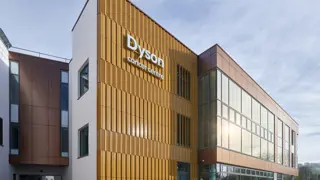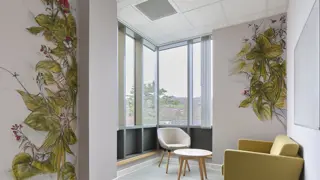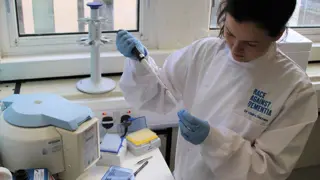Opened in 2011, the centre was designed with parents, staff and babies in mind. The layout ensures staff journeys are efficient and large windows help babies gain an awareness of day and night as they develop.

ROYAL UNITED HOSPITAL, BATH (UK)
THE DYSON CANCER CENTRE
The James Dyson Foundation donated £4 million to develop a pioneering new Cancer Centre at the Royal United Hospital in Bath. The donation has support state-of-the-art medical equipment and dedicated research facilities, as well as art and pastoral gardens. The Dyson Cancer Centre opened for patients in 2024.

PATIENT-LED DESIGN
Research shows that the healing environment created by a building can significantly improve patient experience, reduce stress and improve clinical outcomes. The Cancer Centre has been designed with this in mind: using natural light to give bright, spacious interiors, and removing sources of noise to create a more relaxing environment. It also provides space for relatives and carers to stay overnight, and inpatient rooms are at the top of the building, so patients have the best views over the surrounding countryside. There are spaces to sit and be quiet, or to have private conversations with clinicians, or other patients.
“Patients going through a cancer journey, at every point of it, are under an extreme amount of anxiety and stress. The Dyson Cancer Centre is going to make a huge, positive impact on patient morale and experience, and also positively support the care we provide. There is so much light, so much artwork – once you enter the Centre you are in a space that calms you down".

ADVANCING DEMENTIA RESEARCH
RACE AGAINST DEMENTIA DYSON FELLOWSHIP
The James Dyson Foundation provided £1.5m to Race Against Dementia to fund Dr Claire Durrant's research. Dr Durrant investigates the role of tau, a key protein implicated in both frontotemporal dementia and Alzheimer’s disease. Dr Durrant works with a network of brain surgeons to collect small samples of living human brain, with the patient’s permission, that would otherwise be disposed of following neurosurgery. Slicing them thinly and preserving the samples in dishes, she has proven we can keep brain alive in this way. By adding different drugs or stimuli thought to cause Alzheimer’s disease to the samples, Dr Durrant can watch the changes under a microscope in real time.

DONATIONS AND FUNDRAISING
OVER £1M DONATED TO MEDICAL RESEARCH
Since 2002, we have donated over £2 million in Dyson machines and grants to medical research organisations and fundraising raffles. We have also provided matchfunding to Dyson people's fundraising efforts for medical research charities, such as through 'Tour De Dyson', raising over £1 million.


